#Quran Surah An-Nahl
Text
Surah Al-Isra (Bani Isra’il)
Surah Al-Isra (Bani Isra’il) (in Arabic Text: بنیٓ اسرآئیل / الإسرَاء) is 17th surah (chapter) of Holy Quran. The title surah in English means “The Israelites”. Surah Al-Isra consist of 111 Verses and 12 Ruku. Surah Al-Isra is in Para Para 14. Surah Al-Isra The Surah was revealed in Makkah, It known as Makki Surah. Read and Learn Surah Al-Isra online in Arabic with English translation.
Surah
1…

View On WordPress
#Al-Hijr#An-Nahl benefits#Quran Surah 16#Quran Surah An-Nahl#Surah An-Nahl arabic#Surah an-nahl ayat 125. Surah an-nahl ayat 97#Surah an-nahl ayat 16#Surah an-nahl ayat 36#Surah an-nahl ayat 43#Surah an-nahl ayat 44#Surah an-nahl ayat 72#Surah an-nahl ayat 78#Surah an-nahl ayat 90#Surah An-Nahl english translation#Surah An-Nahl in which para?#surah An-Nahl translation
0 notes
Text
Good Life And Reward In The Hereafter
Whoever does righteousness, whether male or female, while he is a believer - We will surely cause him to live a good life, and We will surely give them their reward [in the Hereafter] according to the best of what they used to do.
Qur'an, Surah An-Naĥl, 16:97
#islam#waytoislam#religion#knowledge#knowislam#quran#verseaday#hereafter#righteousness#surah an nahl verse 97
19 notes
·
View notes
Text
Navigate the delicate balance between physical intimacy and spiritual devotion during Ramadan. Explore Quranic insights on permissible nighttime relations and learn about the consequences and atonements if fasting guidelines are inadvertently broken.
#An-nahl#Islam#MP3#Quran#Reciters#Surahs#Topics#Verses#couple#love#love quotes#marriage#relationship#women#quotes#quotations#quoteoftheday#life quotes#marriage quotes#nature#photography#art#culture#history#movies#music#science#student#travel
0 notes
Photo

Search, Read, Listen, Download and Share #Surah #An-Nahl [16] @ https://quranindex.info/surah/an-nahl #Quran #Islam
0 notes
Video
youtube
full quran with bangla translation para 1 to 30 | 016 সূরা নাহল Surah ...
#youtube#Al Quran translation in Bengali 1 of 30#full quran with bangla translation para 1 to 30#al quran only bangla translation full 30 para#016 সূরা নাহল Surah An Nahl | Surah An Nahl#the holy quran in bangla#সূরা আন নাহল#surah an nahl#sompurno quran bangla onubad soho#quran bangla#bangla quran#bangla waz#best bangla waz#সঠিক ইসলাম শিক্ষা#quran#surah
0 notes
Photo
From Quran Kareem
0 notes
Text
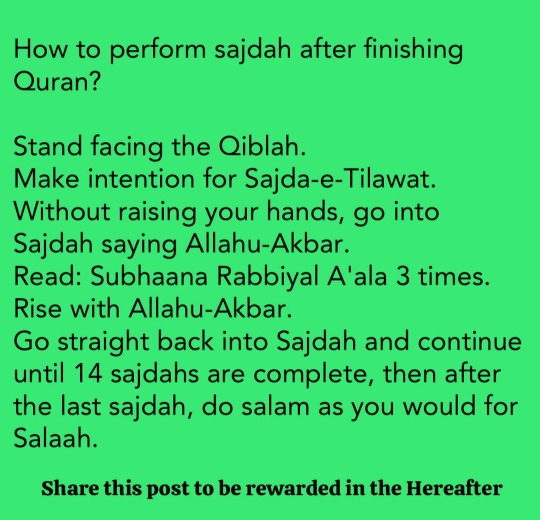
There are 14 sajdahs in Quran:
Juzz (chapter) Surah Ayat (verse)
9 Al Araf 206
13 Al Ra’d 15
14 Al Nahl 50
15 Al Israeel 109
16 Al Maryam 58
17 Al Hajj 18
19 Al Furqaan 60
19 Al Naml 26
21 Al Sajdah 15
23 Sa’ad 24
24 Al Haamim Sajdah 38
27 Al Najm 62
30 Al Inshiqaq 21
30 Al Alaq 19
#islam#quran#islamic#muslim#islamicquotes#pakistan#islamic group#muslim community#muslim countries#istanbul#islamicpost#islamicreminder#muslimah#alhamdulillah#hadith#muslim ummah#allah#makkah#jannah#salah#arabic dua#deen#dua#ramadan#sahihbukhari#sahih
6 notes
·
View notes
Text



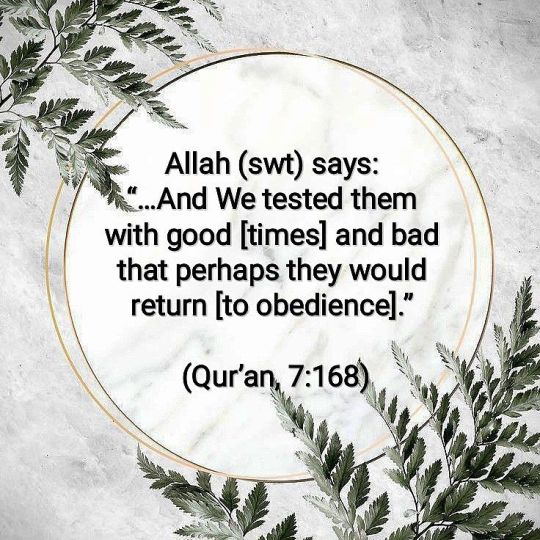








why is the belief in akhirah important
In Islamic doctrine, Al-Akhirah is necessary because the pious often suffer and unbelievers often prosper and enjoy themselves in the temporal world. To rectify that and to bring justice, Al-Akhirah with rewards of Jannah and punishment of Jahannam is necessary.
The hereafter is a form of faith
There are three basic principles of Islamic faith. Namely: Tawheed or Oneness of God, Risalat i.e. Prophets and Messengers and Akhirat i.e. Hereafter. Hereafter is the return to eternal life after death. A thorough judgment of all the actions of this life and the proper good or bad results and the enjoyment of heaven and hell as a consequence. Belief in the Hereafter is one of the five characteristics of believers. In this context, Allah Almighty says in the Holy Qur'an, "And they firmly believe in the Hereafter." (Sura-2 Baqarah, verse: 4).
Human life spans four worlds. Alame Arwaah, Alame Dunya, Alame Barzakh and Alame Akhirat.
There are many verses in the Holy Quran about the Hereafter. For example: 'And certainly the Hereafter is better or better for you than the first world. Soon your Lord will bestow upon you, so that you may be satisfied.
Hereafter is eternal, there is no death. 'Darul Akhira' is mentioned in many verses of the Holy Qur'an about the Hereafter. For example: "The Hereafter is better for the Muttakis." (Sura-7 Araf, verse: 169). (O Messenger of God) you say! O my people, do good deeds as much as you can from your position, I am also doing; Soon you will know for whom the good abode of the end.' (Sura-6 Anam, verse: 135). "Allah is calling you to the abode of peace in the Hereafter." (Sura-10 Yunus, verse: 25). Peace to you! Because you have been patient, how good is the end of the house of Paradise. 'Those who do good deeds, they will get welfare in this world, the abode of the Hereafter is better; How good is the abode of the Muttakis.' (Sura-16 Nahl, verse: 30). "Seek the abode of the Hereafter with what Allah has given you." (Surah 28:77)
Life After Death
youtube
youtube
youtube
2 notes
·
View notes
Text
Menikah itu Cinta atau Tujuan?
Islam memandang bahwa pernikahan merupakan sesuatu yang luhur dan sakral, bermakna ibadah kepada Allah, mengikuti Sunnah Rasulullah dan dilaksanakan atas dasar keikhlasan, tanggungjawab, dan mengikuti ketentuan-ketentuan hukum yang harus diindahkan.
Tujuan pernikahan disebutkan oleh Allah s.w.t di dalam Al quran surah Ar rum ayat at 21 “Dan di antara tanda-tanda kekuasaan-Nya ialah Dia menciptakan untukmu pasangan hidup dari jenismu sendiri, supaya kamu cenderung dan merasa tenteram kepadanya dan dijadikan-Nya di antaramu rasa kasih sayang (mawaddah warahmah). Sesungguhnya pada yang demikian itu menjadi tanda-tanda kebesaranNya bagi orang-orang yang berfikir”.
Manusia diberikan oleh Allah hati adalah untuk bisa saling sayang menyayangi baik sesama manusia maupun makhluk lainnya. Kehadiran cinta akan membuat seseorang lupa akan segala sesuatu. Akan tetapi di dalam pernikahan, tujuan ataukah cinta yang menjadi fundamental?
1. Pengertian dan Anjuran Menikah
Istilah nikah berasal dari bahasa Arab, yaitu ( لنكاح) yaitu penyatuan, perkumpulan atau disebut sebagai akad, ikatan. Rasulullah bersabda
يا مَعْشَرَ الشَّبَابِ مَنْ اسْتَطَاعَ منكُم الْبَاءَةَ فَلْيَتَزَوَّجْ، فَإِنَّهُ أَغَضُّ لِلْبَصَرِ، وَأَحْصَنُ لِلْفَرْجِ، وَمَنْ لَمْ يَسْتَطِعْ فَعَلَيْهِ بِالصَّوْمِ فَإِنَّهُ لَهُ وِجَاءٌ
"Hai sekalian pemuda, barangsiapa di antara kalian sudah memiliki kemampuan, segeralah menikah, karena menikah dapat menundukkan pandangan dan memelihara kemaluan. Dan barangsiapa yang belum sanggup menikah, berpuasalah, karena puasa akan menjadi benteng baginya."
Melalui hadis ini menjelaskan bahwasanya menikah sangat di anjurkan di dalam islam, sehingga Rasulullah menyebutkan bahwasanya barang siapa yang belum mampu untuk menikah maka hendaknya ia berpuasa supaya bias menjadi perisai dirinya dari bermaksiat. Salah satu anjuran menikah adalah untuk menundukkan pandangan dari yang haram kepada yang halal.
2. Tujuan Menikah
Sebelum melangkah jauh, tentunya seseorang yang ingin menikah harus mengetahui dengan jelas tujuan dalam pernikahan nya. Pernikahan sebagai ibadah yang sangat dianjurkan oleh Nabi Muhammad saw sering disalah artikan sebagian kalangan. Ada yang menganggap menikah hanya merupakan media untuk melampiaskan hawa nafsu. Sehingga menjadi suatu hal yang harus untuk di ketahui oleh seseorang yang ingin menikah. Disini penulis telah menulis beberapa tujuan dalam menikah :
a) Menjalankan Perintah Allah
Tujuan menikah yang pertama adalah untuk menjalankan perintah Allah s.w.t Dalam Alquran surat An Nuur ayat 32, Allah memerintahkan hamba-Nya agar menikah.
وَأَنكِحُوا اْلأَيَامَى مِنكُمْ وَالصَّالِحِينَ مِنْ عِبَادِكُمْ وَإِمَآئِكُمْ إِن يَكُونُوا فُقَرَآءَ يُغْنِهِمُ اللهُ مِن فَضْلِهِ وَاللهُ وَاسِعٌ عَلِيمٌ
Dan nikahkanlah orang-orang yang masih membujang di antara kamu, dan juga orang-orang yang layak (menikah) dari hamba-hamba sahayamu yang laki-laki dan perempuan. Jika mereka miskin, Allah akan memberi kemampuan kepada mereka dengan karunia-Nya. Dan Allah Mahaluas (pemberian-Nya), Maha Mengetahui.
b) Menyempurnakan Separuh Agama
Salah satu keutamaan menikah dalah untuk menyempurnakan separuh agama. Mengapa demikian, Umumnya yang merusak agama seseorang adalah kemaluan dan perutnya. Nikah berarti membentengi diri dari salah satunya, yaitu zina dengan kemaluan. Rasulullah bersabda :
إِذَا تَزَوَّجَ العَبْدُ فَقَدْ كَمَّلَ نَصْفَ الدِّيْنِ ، فَلْيَتَّقِ اللهَ فِي النِّصْفِ البَاقِي
“Jika seseorang menikah, maka ia telah menyempurnakan separuh agamanya. Karenanya bertakwalah kepada Allah pada separuh yang lainnya.”
Tujuan menikah dalam Islam adalah untuk menjauhkan diri dari zina. Selain itu, menikah merupakan perintah yang sangat ditekankan oleh Rasulullah.
c) Memiliki Investasi Akhirat ( Anak yang Sholeh/ah )
Selain diperintahkan oleh Allah, menikah juga bertujuan untuk memperoleh keturunan yang saleh. Sebagaimana firman Allah dalam Alquran surat An-Nahl ayat 72 berikut ini:
وَاللَّهُ جَعَلَ لَكُمْ مِنْ أَنْفُسِكُمْ أَزْوَاجًا وَجَعَلَ لَكُمْ مِنْ أَزْوَاجِكُمْ بَنِينَ وَحَفَدَةً وَرَزَقَكُمْ مِنَ الطَّيِّبَاتِ ۚ َ
Allah menjadikan bagimu pasangan (suami atau istri) dari jenis kamu sendiri, menjadikan bagimu dari pasanganmu anak-anak dan cucu-cucu, serta menganugerahi kamu rezeki yang baik-baik.
Memiliki anak merupakan bagian dari tujuan yang harus di persiapkan dari kedua pasangan. Sebagian mereka yang telah menikah memiliki anak akan tetapi tidak mengetahui apa tujuan dari pada mempunyai anak itu. Sejatinya memiliki anak adalah anugerah dari Allah. Akan tetapi menjadikan anak tersebut menjadi anak yang shaleh/ah adalah anugerah terindah yang tentunya harus adanya kerja sama diantara kedua pasangan. Sehingga demikian, maka jelaslah tujuan dari pada mempunya anak yaitu menjadikan nya anak yang shaleh/ah, sehingga nantinya bisa menjadi penolong kedua orang tuanya ketika telah tiada.
3. Menikah dengan Cinta
Rasulullah bersabda :
تُنْكَحُ المَرْأَةُ لِأَرْبَعٍ: لِمَالِهَا وَلِحَسَبِهَا وَجَمَالِهَا وَلِدِينِهَا، فَاظْفَرْ بِذَاتِ الدِّينِ
"Wanita itu dinikahi karena empat hal, karena hartanya, nasabnya, kecantikannya, dan agamanya maka pilihlah yang punya agama”
Sehingga menikah itu dasarnya bukan cinta akan tetapi tujuan, berapa banyak orang yang membangun rumah tangga dengan cinta akan tetapi bertahan hanya sebentar. Menikah dengan cinta maka selama kecintaan kita kepada nya masih ada maka cinta akan selalu melekat, akan tetapi ketika kecintaan kita kepadanya tidak kita dapatkan lagi ataupun telah sirna maka cinta itu juga akan sirna dengan perubahannya. Seorang yang menikahi wanita karena kecantikan nya, maka kecantikannya akan menghilang sesuai dengan waktu yang berlalu, seseorang yang menikah karena harta maka, cinta nya hanya sebatas harta. Akan tetapi seseorang yang menikah karena tujuannya adalah agama, maka pernikahan nya itulah yang akan menuntun mereka dalam ibadah.
Dasar menikah bukan lah cinta, akan tetapi dasar menikah adalah tujuan yang sama. Tujuan nya adalah untuk mendekatkan diri kepada Allah. Menikah ingin memiliki anak, akan tetapi anak yang seperti apa, maka ketika tujuan dari pernikahan diantara keduanya telah sama, maka tujuan mereka memiliki anak adalah menjadi kannya investasi akhirat mereka. Karena didikan mereka yang menjadikan anak tersebut dekat dengan Allah sehingga menjadi anak yang sholeh/ah. Ketika menikah karena tujuannya adalah agama, maka setiap kegiatan yang dilakukan kedua nya korelasi nya adalah ibadah kepada Allah. Sehingga menikah itu bukan dengan cinta akan tetapi menikah itu dengan tujuan agama.
#khoirul-ibnul-ali
4 notes
·
View notes
Photo
Al Quddus meaning
the Very Pure, the Absolutely Pure
Al-Quddus means the Very Pure, the Absolutely Pure. It means the absolutely pure and clean. Allah is free from any impurity or imperfection.
What is the meaning of Allah's name Al Quddus?
The Most Pure, The All-PerfectAllah calls Himself Al-Quddoos— The Most Pure, The All-Perfect— on two occasions in the Quran. He is the One who is the absolutely pure in essence and attributes. Al-Quddoos is free from and far above any worldly imperfection, and He is beyond all human understanding of purity and perfection!
How many times is Al Quddus mentioned in Quran?
The phrase rūḥ al-qudus, commonly translated as the "holy spirit" or the "spirit of holiness", occurs four times in the Quran, in Quran 2:87 and 253, Al-Ma'idah verse 110, and An-Nahl verse 102.
Al-Qudoos (The Holy One) - ALLAH"S Attributes & Names
https://www.youtube.com/watch?v=Vu9vDwYjsO4
How many times is Allah’s Beautiful Name, Al-Quddus, mentioned in the Holy Qur’an?
Allah’s Beautiful Name, Al-Quddus, is mentioned twice in the Holy Qur’an, and both times this Name is mentioned in the same Juz’ of the Holy Qur’an.
Surah Al-Hashr is in the 28th Juz’ of the Holy Qur’an.
{He is Allah, other than whom there is no deity, the Sovereign, the Pure, the Perfection, the Bestower of Faith, the Overseer, the Exalted in Might, the Compeller, the Superior, Exalted is Allah above whatever they associate with Him.} (59:23)
#Al Quddus meaning#Al Quddus#AlQuddus#99 Names of Allah#AsmaWasSifat#asmaul husna#Al Quddus means#Names of Allah#Names of Allah - Al Quddoos#Al-Quddus#Allah Names with Meaning#Beautiful Names of ALLAH#Al-Qudoos (The Holy One)#ALLAH"S Attributes & Names#Al-Qudoos
3 notes
·
View notes
Text
RULE OF LAW IN SO CALLED ISLAMIC REPUBLIC OF PAKISTAN, WHICH IS NEITHER ISLAMIC NOR REPUBLIC, UNFORTUNATELY!
RULE of Law is the bedrock of Islam. Islam attaches great importance to the principles of justice and equality and admonishes its adherents to strictly act upon the injunctions of Islam in this regard.
The spirit of Islam is to establish a society based on the refined principle of Rule of Law. Allah, the sublime in this regard commands in Holy Quran: “Verily, Allah (Subhanahu wa Ta’ala) enjoins Al-Adl (ie justice and worshipping none but Allah (Subhanahu wa Ta’ala) alone — Islamic Monotheism) and Al-Ihsan [ie to be patient in performing your duties to Allah (Subhanahu wa Ta’ala), totally for Allah’s sake and in accordance with the Sunnah (legal ways) of the Holy Prophet (SallAllahu ‘alaihi wa Sallam) in a perfect manner],” (An-Nahl 16: 90).
At another place, Allah (Subhanahu wa Ta’ala) says in the book of guidance: “And act justly. Indeed, Allah (Subhanahu wa Ta’ala) loves those who act justly.” (Al-Hujurat 49:9).
Moreover, Allah, the omnipotent, commands justice in speech as well as in judgments. Allah (Subhanahu wa Ta’ala) says: “And whenever you give your word (i.e. judge between men or give evidence, etc.), say the truth even if a near relative is concerned,” (Al-Anam 6:152). In Surah Al-Nisa, Allah, Almighty further says” “And when you judge between people to judge with justice.” (An-Nisa 4:58).
Holy Prophet (SallAllahu ‘alaihi wa Sallam) himself was an epitome of justice and fairness and staunchly believed in Rule of Law. In administration of justice, he made no distinction between high and low, rich and poor and Muslims and non-Muslims.
From numerous instances reported in the traditions, a few are given below
Sakhr, a chief of a tribe, had helped the Holy Prophet (SallAllahu ‘alaihi wa Sallam greatly in the siege of Taa’if, for which he was naturally obliged to him. Soon after, two charges were brought against Sakhr: one by Mugheerah, May Allah be pleased with him, of illegal confinement of his (Mugheerah’s) aunt and the other by Banu Saalim of forcible occupation of his spring by Sakhr. In both cases, he decided against Sakhr and made him undo the wrong. [Abu Daawood]
Abdullaah Ibn Sahl, (RadiyAllahu ‘anhu), was deputed to collect rent from Jews of Khaybar. His cousin Mahisah, (RadiyAllahu ‘anhu), accompanied him but, on reaching Khaybar, they had separated. Abdullaah, (RadiyAllahu ‘anhu), was waylaid and done to death. Mahisah, may (RadiyAllahu ‘anhu), reported this tragedy to the Prophet (SallAllahu ‘alaihi wa Sallam) but as there were no eye-witnesses to identify the guilty, he did not say anything to the Jews and paid the blood-money out of the state revenues. [Al-Bukhari]
A woman of the Makhzoom family with good connections was found guilty of theft. For the prestige of the Quraysh, some prominent people including Usaamah Ibn Zayd,(RadiyAllahu ‘anhu), interceded to save her from punishment. The Prophet (SallAllahu ‘alaihi wa Sallam) refused to condone the crime and expressed displeasure saying: “Many a community ruined itself in the past as they only punished the poor and ignored the offenses of the exalted. By Allah, if Muhammad’s (My) daughter Fatimah (RadiyAllahu ‘anhaa) would have committed theft, her hand would have been severed.” [Al-Bukhari]
Moreover, in his fatal illness, the Prophet (SallAllahu ‘alaihi wa Sallam) proclaimed in a concourse assembled at his house that if he owed anything to anyone, the person concerned could claim it; if he had ever hurt anyone’s person, honor or property, he could have his price while he was yet in this world. A hush fell on the crowd. One man came forward to claim a few Dirhams which were paid at once. [Ibn Hishaam]
Holy Prophet (SallAllahu ‘alaihi wa Sallam) also laid great stress on resorting to equality in dealing with the people. He asked people to shun notions of racial, familial or any other form of superiority based on mundane things and said that righteousness alone was the criterion of one’s superiority over another. He himself evinced equality in dealing with people on many occasions. Some of such instances are quoted in this piece.
Once the Prophet (SallAllahu ‘alaihi wa Sallam) visited Sa’d Ibn ‘Ubaadah, (RadiyAllahu ‘anhu). While returning, Sa’d (RadiyAllahu ‘anhu) sent his son Qays (RadiyAllahu ‘anhu) with him. The Prophet (SallAllahu ‘alaihi wa Sallam) asked Qays (RadiyAllahu ‘anhu) to mount his camel with him. Qays (RadiyAllahu ‘anhu) hesitated out of respect but the Prophet (SallAllahu ‘alaihi wa Sallam) insisted: “Either mount the camel or go back.” Qays (RadiyAllahu ‘anhu) decided to go back. [Abu Daawood]
At another occasion he (SallAllahu ‘alaihi wa Sallam) was traveling on his camel over hilly terrain with a companion, Uqbah Ibn ‘Aamir, (RadiyAllahu ‘anhu). After going some distance, he asked ‘Uqbah, (RadiyAllahu ‘anhu), to ride the camel, but Uqbah (RadiyAllahu ‘anhu) thought this would be showing disrespect to the Prophet (SallAllahu ‘alaihi wa Sallam). But the Prophet (SallAllahu ‘alaihi wa Sallam) insisted and he had to comply. The Prophet (SallAllahu ‘alaihi wa Sallam) himself walked on foot as he did not want to put too much load on the animal. [An-Nasaa’ee]
To conclude, Rule of Law is part and parcel of our religion. Therefore, we, as a Muslim, must uphold these noble principles of Islam under all circumstances.
0 notes
Text
The Quran's Environmental Ethic: A Call to Environmental Stewardship

Introduction:
In recent years, there has been a growing recognition of the urgent need to address environmental degradation and climate change. Amidst this global challenge, the Quran offers a profound environmental ethic that emphasizes the importance of stewardship, conservation, and sustainable living. In this article, we explore the Quran's teachings on environmental responsibility and their relevance in fostering a harmonious relationship between humanity and the natural world.
Guardians of the Earth:
The Quran teachings portrays humans as stewards (Khalifah) of the Earth, entrusted with the responsibility of safeguarding and preserving its ecosystems. Quranic verses such as Surah Al-An'am (6:165) remind believers of their duty to protect the environment and utilize its resources responsibly, recognizing that all of creation belongs to Allah and must be treated with respect and care.
Balance and Harmony:
Central to the Quranic environmental ethic is the concept of balance (mizan) and harmony (tasfiyah) in the natural world. Quranic verses highlight the intricate interdependence of all living beings and the delicate equilibrium that sustains life on Earth. Humans are admonished against disrupting this balance through greed, exploitation, and overconsumption, as exemplified in Surah Ar-Rum (30:41).
Respect for Creation:
The Quran emphasizes the inherent value and sanctity of all living beings, including plants, animals, and ecosystems. Quranic injunctions prohibit wanton destruction (fasad) of the environment and call for respectful interaction with nature. Surah Al-An'am (6:141) urges believers to avoid wastefulness and extravagance, while Surah Al-Kahf (18:7) narrates the story of the People of the Cave as a lesson in humility and reverence towards creation.
Conservation of Resources:
Quranic teachings advocate for the prudent management and conservation of natural resources, including water, land, and biodiversity. Surah Al-A'raf (7:31) admonishes against the squandering of resources, while Surah Ar-Rahman (55:10-12) celebrates the blessings of water and encourages responsible stewardship. The Quranic principle of 'sustenance for all' (rizq) underscores the importance of equitable distribution and sustainable utilization of resources.
Environmental Justice:
The Quran champions the cause of environmental justice, calling for the protection of vulnerable communities and ecosystems from exploitation and harm. Surah An-Nahl (16:112) exhorts believers to stand up for justice and equity, including the rights of nature and future generations. Quranic teachings emphasize the interconnectedness of social justice and environmental sustainability, recognizing that environmental degradation disproportionately affects marginalized communities.
Contemporary Relevance:
In the face of pressing environmental challenges such as climate change, pollution, and biodiversity loss, the Quran's environmental ethic offers timeless wisdom and guidance. Muslims around the world are increasingly incorporating Quranic teachings into their environmental activism, advocating for sustainable lifestyles, conservation initiatives, and climate action. Moreover, interfaith dialogue and collaboration are fostering greater awareness and solidarity in addressing environmental issues from a spiritual perspective.
Conclusion:
In conclusion, the Quran's environmental ethic provides a compelling framework for addressing the ecological crisis facing our planet. By promoting stewardship, balance, respect, conservation, and justice, Quranic teachings inspire believers to become custodians of the Earth and agents of positive change. As humanity grapples with the imperative to safeguard the environment for future generations, the Quran's timeless message serves as a beacon of hope and guidance in forging a more sustainable and harmonious relationship with nature.
1 note
·
View note
Text
من هدايات سورة النحل
{ثُمَّ أَوۡحَيۡنَآ إِلَيۡكَ أَنِ ٱتَّبِعۡ مِلَّةَ إِبۡرَٰهِيمَ حَنِيفٗاۖ وَمَا كَانَ مِنَ ٱلۡمُشۡرِكِينَ} (123)
وحاصل ما ذكر من الصفات هنا تسعة بل عشرة إذ قوله سبحانه : { ثُمَّ أَوْحَيْنَا إِلَيْكَ } يا محمد ، مع علو درجتك وسمو منزلتك وكونك سيد ولد آدم يرجع لوصف إبراهيم وتعظيمه بأن محمدا أمر باتباعه
والمراد اتباعه صلى الله عليه وآله وسلم في التوحيد والدعوة إليه ، وقال ابن جرير : في التبري من الأوثان والتدين بدين الإسلام ، وقيل : في مناسك الحج ، وقيل : في الأصول دون الفروع . وقال أبو السعود : في الأصول والعقائد وأكثر الفروع دون الشرائع المتبدلة بتبدل الأعصار انتهى .
فإن النبي صلى الله عليه وآله وسلم أفضل الأنبياء عليهم السلام ، وقد أمر بالاقتداء بالأنبياء مع كونه سيدهم فقال تعالى : { فبهداهم اقتده } .
{ ثم أوحينا إليك } الآية ، الوحي إلى محمد صلى الله عليه وسلم بهذا من جملة الحسنة التي آتاها الله إبراهيم
{ ثم أوحينا إليك } يا محمد ، و{ ثم } إما لتعظيمه والتنبيه على أن أجلّ ما أوتي إبراهيم اتباع الرسول صلى الله عليه وسلم ملته ، أو لتراخي أيامه . { أن اتبع ملة إبراهيم حنيفا } في التوحيد والدعوة إليه بالرفق ، وإيراد الدلائل مرة بعد أخرى ، والمجادلة مع كل أحد على حسب فهمه ، { وما كان من المشركين } ، بل كان قدوة الموحدين .
{ثُمَّ أَوْحَيْنَا إِلَيْكَ}، في «ثم» هذه ما فيها من تعظيم منزلة رسول الله صلى الله عليه وسلم، وإجلال محله، والإيذان بأنّ أشرف ما أوتي خليل الله إبراهيم من الكرامة، وأجلّ ما أولي من النعمة: اتباع رسول الله صلى الله عليه وسلم ملته. من قبل أنها دلت على تباعد هذا النعت في المرتبة من بين سائر النعوت التي أثنى الله عليه بها...
فحصل من قوله السابق {ولم يك من المشركين} [النحل: 120] ومن قوله هنا: {وما كان من المشركين} ثلاث فوائد: نفي الإشراك عن إبراهيم في جميع أزمنة الماضي، وتجدّد نفي الإشراك تجدّداً مستمرّاً، وبراءته من الإشراك براءة تامة. وقد علم من هذا أن دين الإسلام منزّه عن أن تتعلّق به شوائب الإشراك لأنه جاء كما جاء إبراهيم معلناً توحيداً لله بالإلهية ومجتثّاً لوشيج الشرك. والشرائعُ الإلهية كلها وإن كانت تحذّر من الإشراك فقد امتاز القرآن من بينها بسدّ المنافذ التي يتسلّل منها الإشراك بصراحة أقواله وفصاحة بيانه، وأنه لم يترك في ذلك كلاماً متشابهاً كما قد يوجد في بعض الكتب الأخرى، مثل ما جاء في التوراة من وصف اليهود بأبناء الله، وما في الأناجيل من موهم بنوّة عيسى عليه السلام لله سبحانه عما يصفون...
ومعنى اتّباع محمد ملّة إبراهيم الواقع في كثير من آيات القرآن أن دين الإسلام بُني على أصول ملّة إبراهيم، وهي أصول الفطرة، والتوسّط بين الشدّة واللّين، كما قال تعالى: {وما جعل عليكم في الدين من حرج ملّة أبيكم إبراهيم} [سورة الحج: 78]...
The text discusses the guidance from Surah An-Nahl in the Quran, emphasizing the importance of following the path of Ibrahim and the implications of following the monotheistic faith. It also highlights the significance of Muhammad as a leader and the need to adhere to his teachings. The text emphasizes the rejection of polytheism and the purity of Islam as a faith free from impurities. Additionally, it discusses the alignment of Islam with the principles of Ibrahim's faith and the balanced nature of the Islamic religion.

0 notes
Text

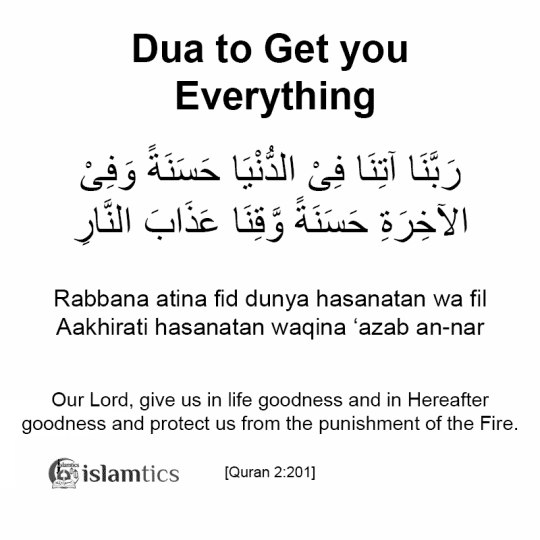


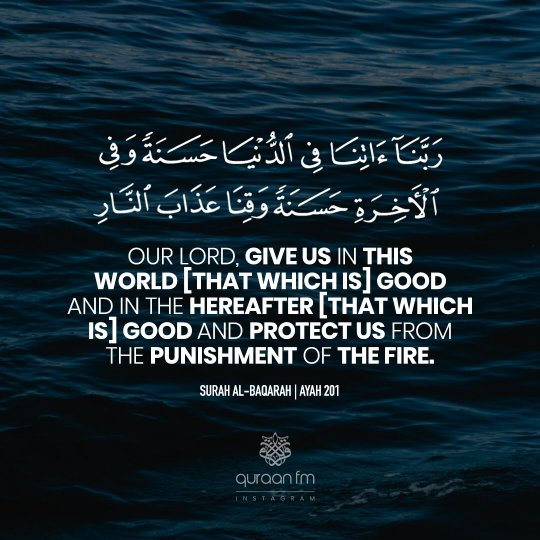
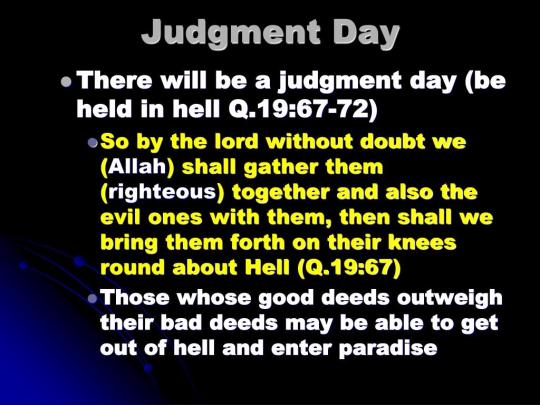
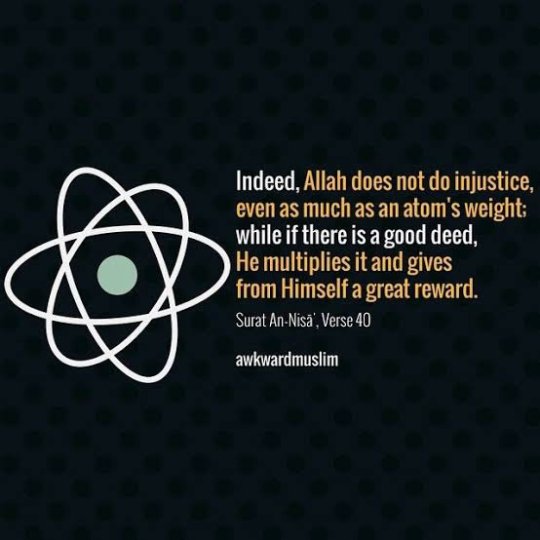


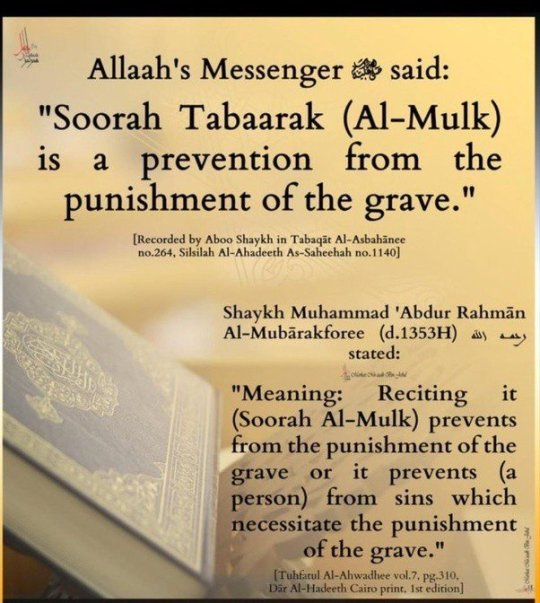
why is the belief in akhirah important
In Islamic doctrine, Al-Akhirah is necessary because the pious often suffer and unbelievers often prosper and enjoy themselves in the temporal world. To rectify that and to bring justice, Al-Akhirah with rewards of Jannah and punishment of Jahannam is necessary.
The hereafter is a form of faith
There are three basic principles of Islamic faith. Namely: Tawheed or Oneness of God, Risalat i.e. Prophets and Messengers and Akhirat i.e. Hereafter. Hereafter is the return to eternal life after death. A thorough judgment of all the actions of this life and the proper good or bad results and the enjoyment of heaven and hell as a consequence. Belief in the Hereafter is one of the five characteristics of believers. In this context, Allah Almighty says in the Holy Qur'an, "And they firmly believe in the Hereafter." (Sura-2 Baqarah, verse: 4).
Human life spans four worlds. Alame Arwaah, Alame Dunya, Alame Barzakh and Alame Akhirat.
There are many verses in the Holy Quran about the Hereafter. For example: 'And certainly the Hereafter is better or better for you than the first world. Soon your Lord will bestow upon you, so that you may be satisfied.
Hereafter is eternal, there is no death. 'Darul Akhira' is mentioned in many verses of the Holy Qur'an about the Hereafter. For example: "The Hereafter is better for the Muttakis." (Sura-7 Araf, verse: 169). (O Messenger of God) you say! O my people, do good deeds as much as you can from your position, I am also doing; Soon you will know for whom the good abode of the end.' (Sura-6 Anam, verse: 135). "Allah is calling you to the abode of peace in the Hereafter." (Sura-10 Yunus, verse: 25). Peace to you! Because you have been patient, how good is the end of the house of Paradise. 'Those who do good deeds, they will get welfare in this world, the abode of the Hereafter is better; How good is the abode of the Muttakis.' (Sura-16 Nahl, verse: 30). "Seek the abode of the Hereafter with what Allah has given you." (Surah 28:77)
Life After Death
youtube
youtube
youtube
0 notes
Photo
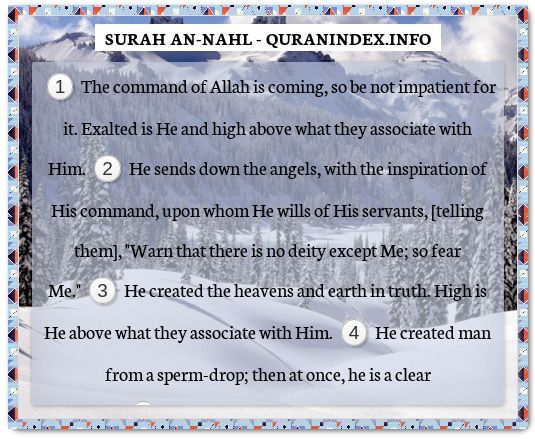
Search, Read, Listen, Download and Share #Surah #An-Nahl [16] @ https://quranindex.info/surah/an-nahl #Quran #Islam
0 notes
Photo

From Quran Kareem
0 notes